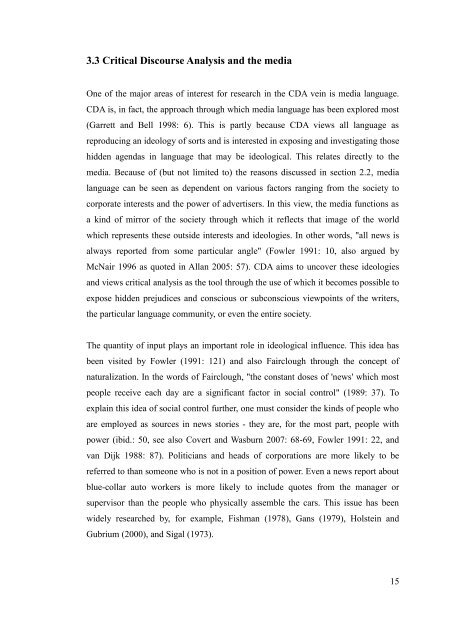Political Bias on BBC, CNN, and Fox News - Doria
Political Bias on BBC, CNN, and Fox News - Doria
Political Bias on BBC, CNN, and Fox News - Doria
Create successful ePaper yourself
Turn your PDF publications into a flip-book with our unique Google optimized e-Paper software.
3.3 Critical Discourse Analysis <strong>and</strong> the media<br />
One of the major areas of interest for research in the CDA vein is media language.<br />
CDA is, in fact, the approach through which media language has been explored most<br />
(Garrett <strong>and</strong> Bell 1998: 6). This is partly because CDA views all language as<br />
reproducing an ideology of sorts <strong>and</strong> is interested in exposing <strong>and</strong> investigating those<br />
hidden agendas in language that may be ideological. This relates directly to the<br />
media. Because of (but not limited to) the reas<strong>on</strong>s discussed in secti<strong>on</strong> 2.2, media<br />
language can be seen as dependent <strong>on</strong> various factors ranging from the society to<br />
corporate interests <strong>and</strong> the power of advertisers. In this view, the media functi<strong>on</strong>s as<br />
a kind of mirror of the society through which it reflects that image of the world<br />
which represents these outside interests <strong>and</strong> ideologies. In other words, "all news is<br />
always reported from some particular angle" (Fowler 1991: 10, also argued by<br />
McNair 1996 as quoted in Allan 2005: 57). CDA aims to uncover these ideologies<br />
<strong>and</strong> views critical analysis as the tool through the use of which it becomes possible to<br />
expose hidden prejudices <strong>and</strong> c<strong>on</strong>scious or subc<strong>on</strong>scious viewpoints of the writers,<br />
the particular language community, or even the entire society.<br />
The quantity of input plays an important role in ideological influence. This idea has<br />
been visited by Fowler (1991: 121) <strong>and</strong> also Fairclough through the c<strong>on</strong>cept of<br />
naturalizati<strong>on</strong>. In the words of Fairclough, "the c<strong>on</strong>stant doses of 'news' which most<br />
people receive each day are a significant factor in social c<strong>on</strong>trol" (1989: 37). To<br />
explain this idea of social c<strong>on</strong>trol further, <strong>on</strong>e must c<strong>on</strong>sider the kinds of people who<br />
are employed as sources in news stories - they are, for the most part, people with<br />
power (ibid.: 50, see also Covert <strong>and</strong> Wasburn 2007: 68-69, Fowler 1991: 22, <strong>and</strong><br />
van Dijk 1988: 87). Politicians <strong>and</strong> heads of corporati<strong>on</strong>s are more likely to be<br />
referred to than some<strong>on</strong>e who is not in a positi<strong>on</strong> of power. Even a news report about<br />
blue-collar auto workers is more likely to include quotes from the manager or<br />
supervisor than the people who physically assemble the cars. This issue has been<br />
widely researched by, for example, Fishman (1978), Gans (1979), Holstein <strong>and</strong><br />
Gubrium (2000), <strong>and</strong> Sigal (1973).<br />
15

















